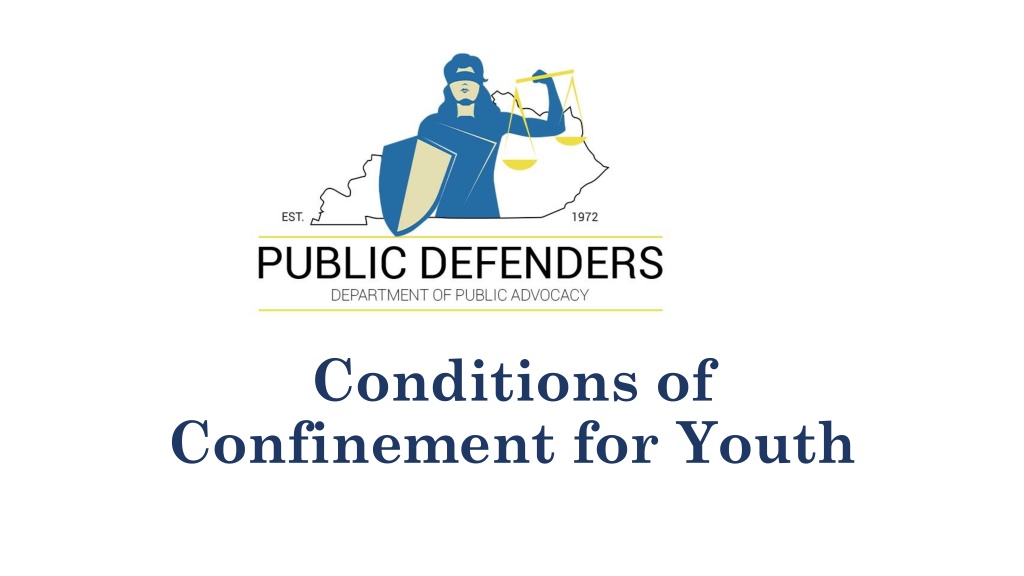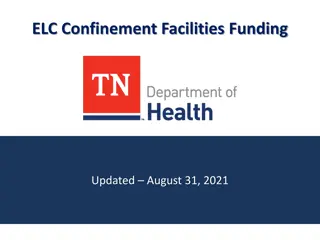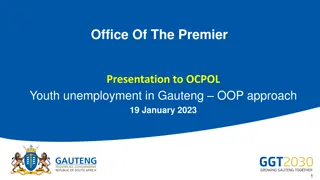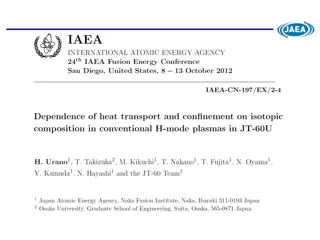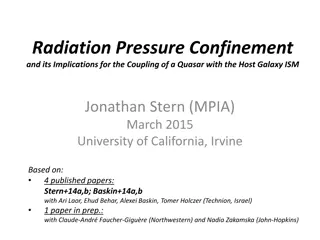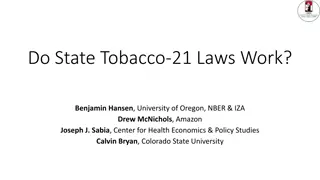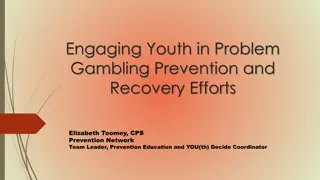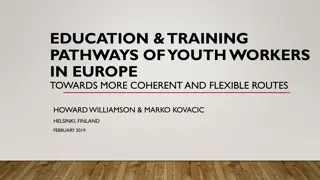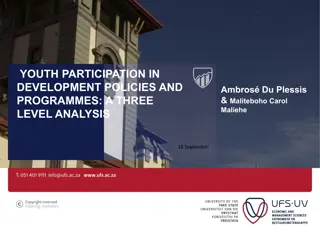Youth Confinement Conditions: Laws and Policies Overview
Youth confinement conditions are governed by specific laws and policies to protect minors in custody. In Kentucky, minors are entitled to legal representation for prison-related claims involving violations of federal or state laws. Non-behavioral isolation policies strictly regulate the use of isolation for juvenile offenders. However, reports indicate instances where children were placed in isolation without proper procedures. Understanding the legal rights and policies surrounding youth confinement is crucial to ensure the well-being of minors in custody.
Uploaded on Oct 04, 2024 | 0 Views
Download Presentation

Please find below an Image/Link to download the presentation.
The content on the website is provided AS IS for your information and personal use only. It may not be sold, licensed, or shared on other websites without obtaining consent from the author. Download presentation by click this link. If you encounter any issues during the download, it is possible that the publisher has removed the file from their server.
E N D
Presentation Transcript
Conditions of Confinement for Youth
KRS 31.110(4) A person, whether a needy person or not, who is a minor under the age of eighteen (18) and who is in the custody of the Department of Juvenile Justice and is residing in a residential treatment center or detention center is entitled to be represented on a legal claim related to his or her confinement involving violations of federal or state statutory rights or constitutional rights.
KRS 31.110(1) A needy person who is accused of having committed a public or status offense or who has been committed to the Department of Juvenile Justice or Cabinet for Health and Family Services for having committed a public or status offense as those are defined by KRS 610.010(1), 610.010(2)(a), (b), (c), or 630.020(2) is entitled: (a) To be represented by an attorney to the same extent as a person having his or her own counsel is so entitled;
(1) Non-Behavioral Isolation* There is no policy that allows for non-behavioral isolation Policy 300 2.X: Disciplinary Confinement means placement of a juvenile in a secure room per a Disciplinary Review Hearing by the Treatment Team for a Major Rule Violation. Placement shall take into account the youth s prior conduct and specific program needs. Disciplinary Confinement shall not exceed five (5) days for any particular offense. *Not a DPA term
(1) Non-Behavioral Isolation Policy 300 2.SS: Isolation means the removal of a youth from the general population and placed in a room with the door closed for a threat to the safety or security of the facility, staff or youth. Isolation shall never be used as a punishment or disciplinary sanction.
(1) Non-Behavioral Isolation Policies 323 and 717: Specifically note that isolation cannot be used for suicide prevention or as a means of keeping children in protective custody. Policy 717: Isolation may only be used for major rule violations.
Yet, Children were regularly placed in non- behavioral isolation for days, upon entering the AYDC facility. No Disciplinary Review Hearing by the Treatment Team; No Major Rule Violations; and No identifiable threat to the safety or security of the facility, staff or youth.
Sources: Interview with former DJJ employee Open records request of children placed at AYDC Client s DJJ file
(2) Isolation Due to Behaviors Policies 318 and 323 note isolation should not be a preferred method of behavior management, as least restrictive behavior management should be utilized first. As noted, children may only be placed in isolation for major rule violations and not minor rule violations. Minor rule violations include being disrespectful to staff or residents, refusing to follow staff instructions, making verbal threats, violating a dress code. Should be handled by assigned work detail, curfew, loss of privileges, etc.
(2) Non-Behavioral Isolation Major rules violations include escape, AWOL, physical or sexual assault, poss n of contraband, major property damage, chronic program disruption, positive drug test; Policies 205, 300, 318.2 and 718 require due process for an allegation of a major rule violation. Due Process involves an investigation within 24 hours, a review hearing by the treatment team, and includes an appeals process.
Yet, Children were not being afforded this process, but were simply placed in isolation through unilateral decisions from staff. No treatment teams were making disciplinary decisions. Other policies attendant to isolation were not being followed including regular nurse consultations, access to recreation and showers, creation of a behavior plan, and creation of isolation packets which do not appear to exist.
Sources: Interview with former DJJ employee Complaint filings Client s DJJ file
(3) Non-Adherence to Grievance and Use of Force Policies Policies 110.2-2 and 205 note grievance forms should be accessible to children at all times and reviewed by administrative staff daily. These were not regularly available to youth. Policies 331, 140, 142 and 715 require any special incidents such as excessive or inappropriate use of force be reported to internal Investigation Branch immediately. Staff members involved in a special incident are supposed to be removed from contact with the alleged victim of the incident during the investigation.
Yet, AYDC did not follow the above noted policies. Incidents were going unreported for extended periods of time, if at all. In one case, there was a 2-month delay. Staff continued to interact with the youth involved. Children were being sprayed with mace / pepper spray almost daily in ways that were substantiated as excessive force. They were left to sit in their cells for extended periods of time without being decontaminated, and without their cell being decontaminated.
Sources: IIB (Internal Investigations Branch) Reports dated August 4, 2022, January 17, 2023, January 23, 2023, March 14, 2023, March 19, 2023 Report from client Complaint filings
(4) Inhumane Living Conditions Policy 205 states that children are entitled to clean bedding, linens and clean mattresses. Yet, The day prior to the riot, a sprinkler broke in one of the pods, soaking the pod and everything in it. Children were not immediately given access to showers, but were forced to stay in damp clothing, with water in the pod. There were no dry places to sit or lie down. This occurred for around 24 hours.
Sources: Control room log from November 10, 2022 IIB interview dated January 25, 2023 and February 2, 2023 Legislative Oversight and Investigations Committee Testimony on July 14, 2023 Report from client
(5) No Access to Mental Health Treatment or Education Children were regularly held in isolation for days at a time, during which they did not receive appropriate mental health treatment or education. Policy 303 calls for treatment teams, which would consist of a DJJ staff member, youth, parents and other supporters who work collaboratively to aid youth in achieving goals. These teams are required to meet weekly. Policies 300 and 302 require each youth have an individualized treatment plan which include a written document that has the youth s risk and needs determined. These plans are to be reviewed and potentially updated every 30 days.
Yet, AYDC does not appear to be using treatment teams, and decisions are being made independently by the superintendent with no oversight from anyone. AYDC does not have a required youth counselor. Treatment plans are not being utilized for youth. Required group counseling (3 times a week) is not occurring. Individual youth counseling an hour a week was not occurring for long periods of time. Family counseling is not occurring (Policy 307). No required education, vocational programs, substance abuse treatment and other things are being provided.
Sources: Interview with former DJJ employee Resignation of different former DJJ employee dated June 8, 2022 Client records Complaint filings Annual Comprehensive QA Monitoring Report for Adair Youth Development dated March 31, 2021
